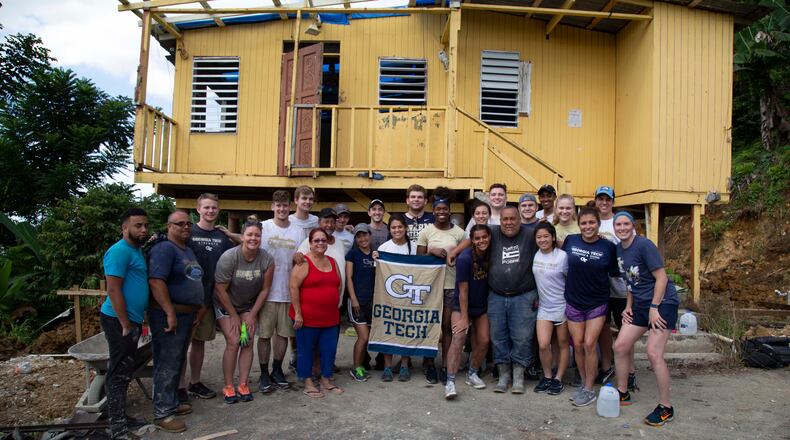Brad Stewart flew home from Puerto Rico on May 12 with memories that he intends never to forget. The Georgia Tech wide receiver plans to keep forever a Puerto Rican flag that he received as a gift. After spending a week-long service trip on the hurricane-ravaged island with 17 other Tech athletes and three staff members, Stewart wants to ensure that the lessons of his experience there do not stray too far from him.
“Hopefully I’ll continue to keep those images in my head and act upon them,” Stewart said. “We can’t save the world in one day but every step towards it you can, you should take.”
The Tech group was in Puerto Rico for eight days, spending a couple of days sightseeing but devoting most of its time to aiding a rural mountainside community on the north side of the island that was destroyed by Hurricane Maria in September. While Stewart’s football team and its fans grumbled about the cancellation of the Central Florida game because of Hurricane Irma, he and the rest of the travel party came face to face with hurricane damage that was far more grave.
Eight months after Maria struck, some houses in the coastal town of Vega Alta were still without power and water. Traffic lights were not yet operating. Outside condemned homes, furniture sat by the side of the road.
“You see articles and stuff online with pictures and stuff like that, but until you actually experience it firsthand, you’re not going to understand what they’re really going through,” Stewart said. “And when I got there, it was just crazy what they were having to go through day to day just to continue to make it by and continue to help other community members who couldn’t help or weren’t able to help.”
The team focused its efforts on reinforcing homes that remained standing through the hurricane or laying concrete foundations for homes, some not bigger than one or two rooms, that were obliterated beyond repair. Working alongside residents, they mixed cement, formed bucket brigades up steep inclines and cut and laid rebar. among other tasks. In tropical heat, they put in four days of toil.
“Not once did I hear anybody complain,” said Brad Malone, a Tech staffer who made the trip. “So I think that was cool for me personally and as someone that works at Georgia Tech to see the resiliency of our student-athletes just across all sports.”
The trip was the second led by the athletic department under the banner of “Jackets Without Borders,” following the initial trip last August to Costa Rica to build an all-sports court for a local high school. The goal is to have two such trips a year to accommodate as many athletes and team schedules as possible. This trip included representatives of the football, women’s basketball, volleyball, swimming and diving and dance teams.
The trip fit under the umbrella of the athletic department’s Total Person Program, the initiative created by former athletic director Homer Rice in the early 1980s to help athletes achieve academic excellence, athletic achievement and personal well-being.
“Most of them think they’re going to have this great impact on the community, which we think we did,” said Maureen Tremblay, the coordinator of the Total Person Program. “But at the same time, the impact that happens with each individual is greater than what they have done for the community.”
The Total Person Program’s biggest supporter is athletic director Todd Stansbury, who was a Tech linebacker when Rice instituted the Total Person Program and later managed the academic support department for Rice. He created similar programs when he was AD at East Tennessee State, Central Florida and Oregon State.
When he was hired in 2016, he sought to elevate the program’s importance in the athlete experience at Tech and made the establishment of Jackets Without Borders a priority, having created “Without Borders” teams at UCF and Oregon State.
While not his sole motivation, Stansbury sees in the Total Person Program a way to differentiate Tech in its recruiting efforts.
Tech can’t often sell recruits on the shiniest and most expansive facilities or, correspondingly, doesn’t have room in its budget for every latest training trend. But Tech coaches have pitched prospects on the wealth of summer internship opportunities available to athletes (also part of the Total Person Program) and, now, the chance to expand their worlds through serving the less fortunate.
In the ACC, some schools have similar opportunities for athletes, though they are largely run through other entities, not the athletic department. Recruits have committed to Tech on the merits of the Total Person Program, Tremblay said.
“Very, very glad I went,” Stewart said.
For this trip, athletes were responsible for the cost of the trip, which was $2,000. Tremblay’s goal is to have funding for Jackets Without Borders, although she would want athletes to still be responsible for some of the cost to give them ownership in the trip.
Stewart and his five teammates who made the trip (Liam Byrne, Charlie Clark, Carson Fletcher, Hamp Gibbs, Austin Nash) have already shared plans to get more teammates involved in the future. Stewart called it a “life-changing experience.”
“Hopefully, the number continues to grow and becomes a really big event for Georgia Tech because every student-athlete that goes will be impacted positively and really, really help change their lives in a positive way,” Stewart said.
About the Author
Keep Reading
The Latest
Featured




